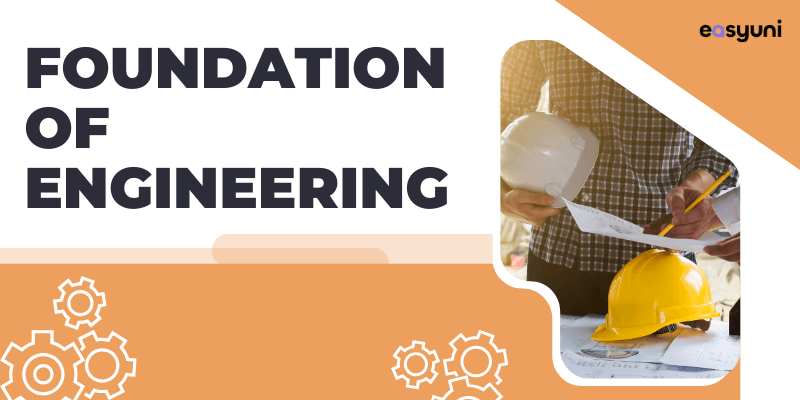
Do you possess skills in construction, equipment installation, or perhaps you have a creative mind? Even better, are you proficient at calculations? If so, you might have a knack for pursuing tertiary education in Engineering!
If you're interested in studying Engineering but unsure where to begin, don't worry; we're here to help you!
One excellent way to start exploring this program is by enrolling in a Foundation in Engineering. This program will introduce you to fundamental subjects, helping you build a strong understanding and providing an overview of the field.
This guide will outline everything you need to know before pursuing this program. Come, let's find out more about studying Foundation in Engineering in Malaysia!
What is Foundation in Engineering all about?
The Foundation in Engineering is a pre-university program aimed at providing students with the essential knowledge and skills necessary for pursuing related Bachelor’s Degree programs.
Throughout the program, you will develop a strong understanding of core principles in mathematics, physics, and other relevant subjects, including mechanics and thermodynamics.
By studying these subjects, you will establish a solid academic foundation essential for undergraduate Engineering courses.
With that being said, this program offers you the opportunity to explore various branches of Engineering such as mechanical, electrical, civil, and chemical Engineering.
What's more, it also provides a direct pathway to undergraduate studies. So, it's important for you to grasp the fundamental concepts necessary in the field of Engineering.
This will enable you to make informed decisions about which engineering pathways to pursue at the degree level and in your future career.
What are the requirements to pursue this course?
- SPM/ SPMV: Minimum of grade C in at least 5 subjects, including Mathematics and 1 science subject.
- O-Level: Minimum of grade C in at least 5 subjects, including Mathematics and 1 science subject.
- UEC: Minimum of grade B in 3 subjects inclusive of Mathematics and 1 science subject
How much does it cost to study Foundation in Engineering in Malaysia?
The tuition fees for this program vary depending on the university, but generally, they range between RM6,500 to RM30,000.
What subjects will you learn in this course?
Here’s a breakdown of subjects commonly included in Foundation in Engineering:
- Chemistry
- Physics
- English
- Calculus
- Engineering Mathematics
- Introduction to Probability & Statistics
However, several colleges and universities in Malaysia include additional subjects in their curriculum. This is because the field of Engineering encompasses more than just construction and mathematics.
This foundation program also serves as the basis for business and IT-related fields such as software engineering, computer science, computer engineering, and various design fields.
Therefore, among the other subjects you will study if you enroll in this program are:
- Introduction to Business Management
- Computing Studies
- Programming
- Computer Aided Design
- Introduction to Visual & Interactive Programming
Which Malaysia’s universities offer Foundation in Engineering?
1. Multimedia University (MMU)
2. Taylor’s College
3. Asia Pacific University of Technology & Innovation (APU)
4. Management and Science University (MSU)
5. University of Wollongong Malaysia (UOW)
Universities in Malaysia
-

Malaysia
-

Selangor, Malaysia
-

Sunway University
FeaturedSelangor, Malaysia
-

Sunway College
FeaturedSelangor, Malaysia
-

Asia School of Business (ASB)
FeaturedWP Kuala Lumpur, Malaysia
-

SEGi University Kota Damansara
FeaturedSelangor, Malaysia
-

WP Kuala Lumpur, Malaysia
-

Malaysia
-

University of Cyberjaya (UoC)
FeaturedMalaysia
-
WP Kuala Lumpur, Malaysia
See more related universities
What are the pathways for Engineering courses that you can pursue at the degree level?
After completing your Foundation in Engineering, there are numerous courses in the Engineering field that you can pursue including:
1. Mechanical Engineering
If you pursue mechanical Engineering, you will find that it feels with the design, analysis, and manufacturing of mechanical systems and devices.
With a Mechanical Engineering Degree, you can work in various industries including automotive, aerospace, and manufacturing.
You will be designing and improving products, developing energy systems, and optimizing manufacturing processes.
2. Electrical Engineering
As the name suggests, electrical Engineering focuses on the study and application of electricity, electronics, and electromagnetism.
In this field of work, you will be designing and implementing electrical systems, such as power generation and distribution, telecommunications, and electronic devices like computers and smartphones.
3. Civil Engineering
Civil Engineering involves the planning, design, construction, and maintenance of infrastructure and built environments.
Civil engineers can work on projects ranging from buildings and bridges to roads and water supply systems.
If you are planning to pursue this course, you need to know that the key focus of the course is to ensure the safety, efficiency, and sustainability of our infrastructure.
4. Chemical Engineering
Chemical Engineering combines the principles of chemistry, physics, biology, and mathematics to design processes for producing chemicals, pharmaceuticals, fuels, and materials.
If you are interested in continuing your studies in this course, some of your future career pathways include working in industries such as petrochemicals, pharmaceuticals, food processing, and environmental Engineering.
5. Computer Engineering
If you are interested in designing and developing computer hardware and software systems, computer Engineering might be the one for you as this course integrates the principle of electrical Engineering and computer science.
In future, you may work on designing computer chips, developing software applications, or optimizing computer networks for various industries.
6. Aerospace Engineering
When you were younger, did you love playing with airplanes or building spacecraft out of Lego pieces?
Well, aerospace Engineering might be for you as it focuses on the design, development, and testing of aircraft, spacecraft, and related systems.
Aerospace engineers may work in research and development (R&D), manufacturing, or government agencies, contributing to advancements in aviation, space exploration, and defense technologies.
7. Biomedical Engineering
For this course, it applies Engineering principles to solve challenges in healthcare and medicine.
If you are interested in this career pathway, you may be working on designing medical devices, developing imaging systems, or researching new treatments and therapies. The aim of this field is to improve patient care and quality of life.
8. Environmental Engineering
Environmental Engineering, as the name suggests, addresses environmental challenges by designing solutions to protect and preserve natural resources and ecosystems.
Working in this field means you will be working on projects related to water and air quality, renewable energy, waste management, and sustainable development.
9. Industrial Engineering
Industrial Engineering focuses on optimizing complex systems and processes to improve efficiency, productivity, and quality.
Once completed this degree, you can work in manufacturing, logistics, healthcare, or consulting, analyzing operations and implementing strategies to streamline workflows and reduce costs.
10. Petroleum Engineering
Petroleum Engineering involves the exploration, extraction, and production of oil and gas resources.
Professionals in this field work on drilling techniques, reservoir management, and production optimization.
This field plays a vital role in meeting global energy demands and ensuring the efficient extraction of hydrocarbons.
How should you choose a branch of Engineering at the Degree Level?
Choosing a branch in Engineering at the Degree level is a significant decision that can shape your academic and professional future. Here are some steps to help you to make an informed choice:
1. Do self-assessments
Understanding your personal and professional interests and skills can greatly assist in determining the most suitable degree path for you.
To identify your interests, reflect on topics you are passionate about or activities you enjoy. You can conduct self-assessments to pinpoint your strengths and weaknesses, or review your academic history for insights.
For instance, proficiency in mathematics and science is crucial for many Engineering fields. By assessing your performance in these subjects, you can discern which areas you excel in.
If you find yourself less proficient in both, you might discover a better fit in IT-related fields, which also offer the opportunity to specialize at the degree level.
Additionally, consulting with your lecturers can provide valuable insights into your academic performance, highlighting your strengths and areas for improvement.
2. Consider future plans
It is highly important to consider your future plans, so make sure you look beyond the years after graduating with a Bachelor’s of Engineering.
Look beyond your immediate post-graduation goals and envision where you aspire to be in the long term. Reflect on your career aspirations and the impact you hope to make in your chosen field.
Do you see yourself pursuing further education, such as a Master's or Doctoral Degree? Are you interested in specific industries or sectors, such as aerospace, renewable energy, or biomedical Engineering?
By aligning your Engineering specialization with your future plans, you can ensure that your academic and career trajectory are in harmony with your long-term goals and aspirations.
3. Evaluate job market trends
Research the current and projected job market demand for different Engineering disciplines.
Consider factors such as industry growth, salary potential, and geographic location to assess the long-term viability of your chosen field.
Furthermore, stay informed about technological advancements, regulatory changes, and global trends shaping the Engineering profession.
Other than that, networking with professionals in the Engineering industry can provide valuable insights into job market trends and potential career opportunities.
Attend career fairs, industry events, and networking forums to connect with engineers working in different fields and gather firsthand information about job prospects and industry trends.
What are the benefits of studying Foundation in Engineering offer in Malaysia?
Common questions like "is studying engineering in Malaysia worth it?" are often posed by students who aspire to pursue engineering. It is a good question, by the way, as it ensures that you make an informed decision after careful consideration.
Here are the advantages for those of you aspiring to pursue careers in Engineering.
1. Smooth transition to Degree programs
Foundation in Engineering programs offered in Malaysia provide a structured pathway for students transitioning from pre-university to degree studies.
These programs typically offer intensive coursework in core subjects such as mathematics, physics, and other relevant subjects. The aim is to ensure that students are academically prepared for the rigorous demands of undergraduate Engineering Degrees.
Furthermore, Foundation in Engineering programs in Malaysia are often recognized and accredited by professional engineering bodies, both locally and internationally. This ensures that graduates meet the necessary standards and are well-prepared for their future careers in the field of Engineering.
2. Exploration of Engineering disciplines
Many Foundation in Engineering programs in Malaysia offer a multidisciplinary approach, exposing students to various branches of Engineering such as civil, mechanical, electrical, and chemical Engineering.
Through introductory courses and hands-on projects, you can explore different different disciplines, discover your interests, and make informed decisions about your future specialization.
In conclusion, choosing to pursue Foundation in Engineering in Malaysia sets you on a clear path towards a dynamic and fulfilling career in the related field. Through this program, you will acquire the essential knowledge, skills, and opportunities needed to thrive in the ever-evolving world.
If you're interested in enrolling in this program, you can contact our Study Advisor at EasyUni via WhatsApp or email. They will provide you with the latest information and precise details regarding tuition fees and what it's like to study in Malaysia.
Don't worry, our assistance is completely free, and there are no service fees charged!
 +60142521561
+60142521561






